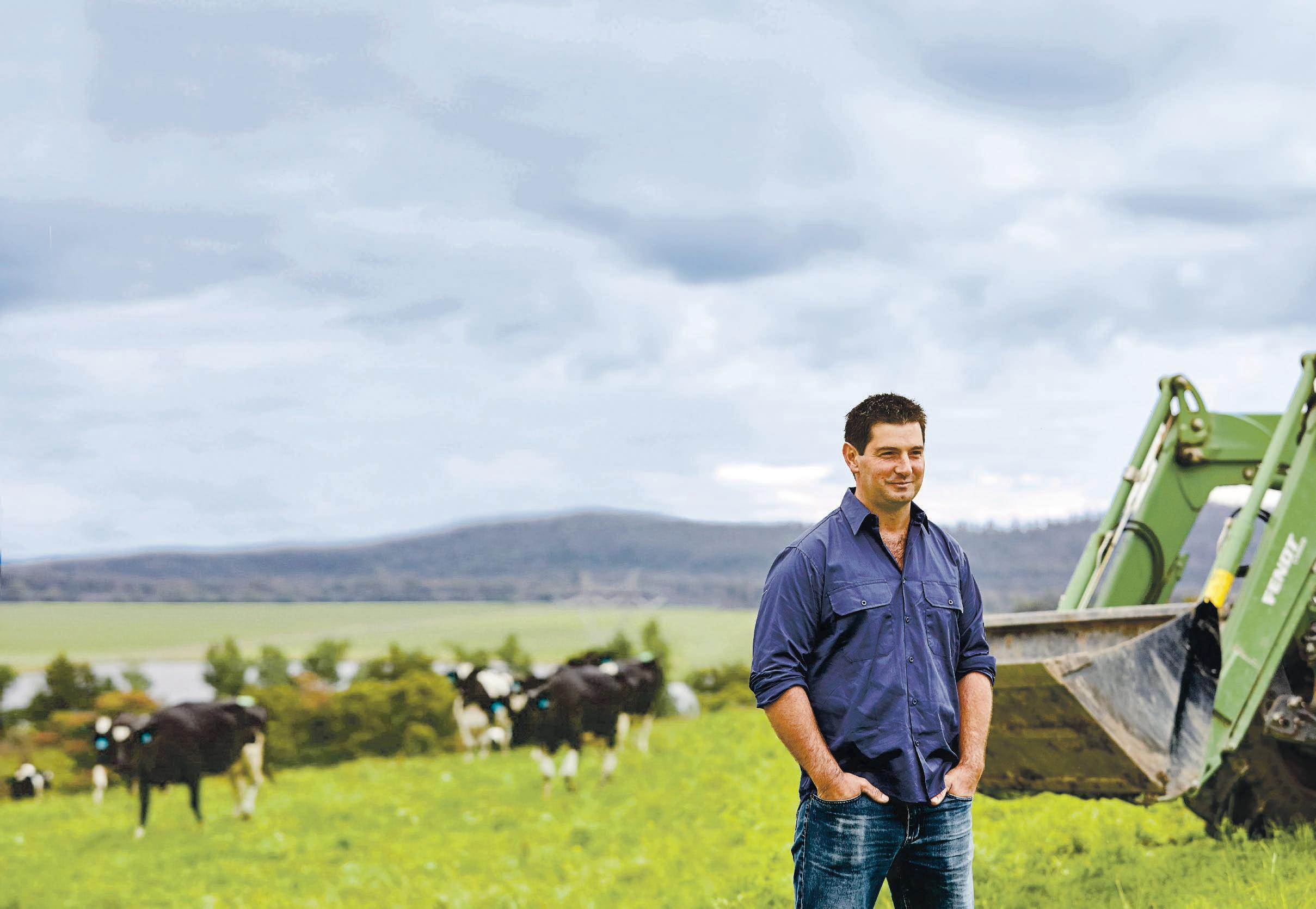









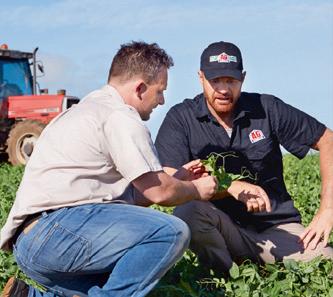
































I’M SITTING in very warm northern Victoria as I write this report, having returned to our ‘normal’ routine of spending a week at International Dairy Week in Tatura.
Today all activities were youth-focused and I was proud to play a small part in the running of the Youth Challenge, now in its 20th year.
To see 130-plus kids, some from across the ditch in New Zealand, working together in teams, supporting each other and enjoying their shared passion for cows and the dairy industry augers well for the future.
We are always grateful for the opportunity to get off the farm, visit other dairy regions and reconnect with friends and colleagues accumulated over many years now.
We are also grateful to the folks back home ‘minding the fort’; not to mention the cow tech that lets me monitor herd health from afar.
At WestVic Dairy, we are really excited to
be starting off the new year with almost a full contingent of staff on deck, with some of our newer arrivals now fully across and engaged in their roles and ready to support your business.
To keep up to date with extension activities happening in your area, check out our events calendar on the WestVic Dairy website. Following our Facebook and Instagram pages is another way to stay informed.
If you have any ideas, issues or need support to register for events, you can always call the office on 5557 1000.
Did you know that the Dairy Farms Job Board is now live and can be accessed via the Dairy Australia website? The Jobs Board is just one of a suite of employment promotion and engagement resources on the Diary Australia website.
Google is your friend. Just look for *Dairy Australia, *People, Skills & Capability,


Cream of the Crop, a conference for dairy farming women, will return in 2023 and is set to become an annual event.
Organisers of last year’s successful debut event have announced it will return in March.
The conference is an opportunity for women in the dairy industry to come together to learn, connect and reflect.
Cream of the Crop was the brainchild of south-west Victorian dairy farmers Chloe Brown, Lucy Collins and Renata Cumming, and was attended by about 100 people in February 2022 in Port Campbell.

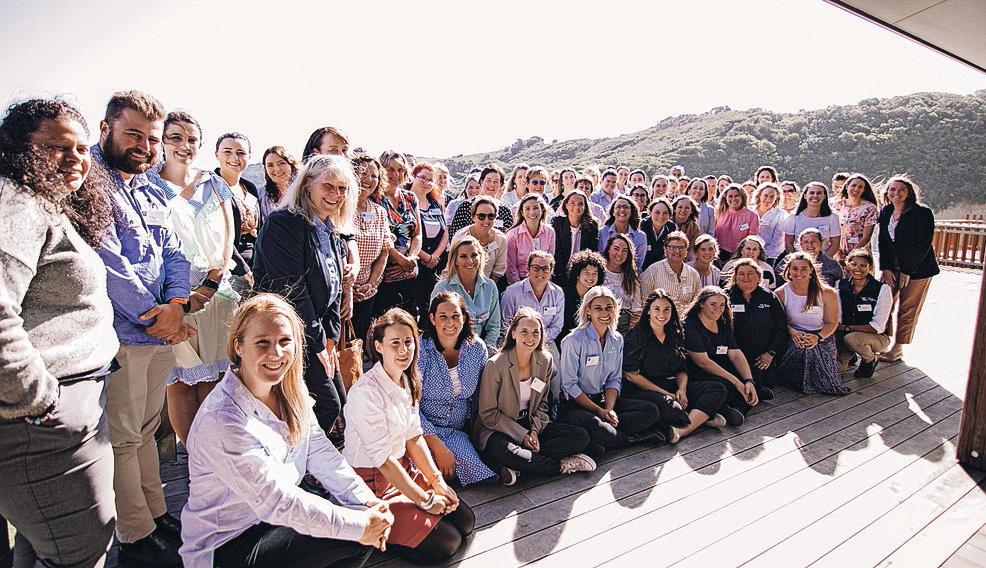
The committee has since expanded with the addition of Jess Brown who adds a wealth of financial and dairy knowledge.
“After strong attendance and overwhelmingly positive feedback, we are thrilled to make this conference an annual event and planning is well under way for [the 2023] conference,” Ms Cumming said.
Early-bird tickets have been released for the March 1 and 2 event, with the first day held in the Koroit Theatre, followed by an
evening networking event in Warrnambool and a half-day tour in the surrounding region.
The program will give attendees the opportunity to be challenged and inspired by speakers, panels, workshops, and farm and factory tours; as well as being able to network with like-minded people in the industry.
The conference is open to farmers and service providers of all ages and stages, and the organisers encourage both group and individual registrations.
A 2022 event attendee and DemoDAIRY Foundation scholarship recipient, Emily Walsh, described Cream of the Crop as empowering.
“Sitting in a room full of successful women was the start of an already fantastic event,” Ms Walsh said.
“Every word spoken by the speakers had me truly engaged in what they had to say, each linking in with one another and each extremely passionate about their line of work.
*Reaching Jobseekers and you have landed in the right place.
Additionally, remember that at WestVic, Sam Andrews works as our regional project lead for workforce attraction, and can be contacted via the office for all workforce related issues.
2022 also brought some good news for Victorian dairy farmers, with the Department of Environment, Land, Water and Planning announcing that dairy farmers only need to register using old tyres to weigh down silage, replacing the paid licence system.
Farmers using more than five cubic metres of waste tyres for silage production need to register their tyres with Environment Protection Authority Victoria by July 1, 2023.
This change comes after more than two years of consultation between Dairy Australia, DELWP, Environment Protection Authority Victoria, the United Dairyfarmers of Victoria,
and the Victorian Farmers Federation — indicative of what can be achieved when the industry works together to resolve contentious issues.
As the new year unfolds before us, please remember at WestVic we are your Dairy Australia levies at work and we welcome every opportunity to connect and support your enterprise.
And as I reflect on more than 30 years of watching and supporting the many activities that make up International Dairy Week, this quote from Pele — “Success is no accident. It is hard work, perseverance, learning, studying, sacrifice and most of all, love of what you are doing or learning to do” — seems an appropriate way to conclude.
Best wishes to all for a safe, successful season ahead.
Jacqui Suares WestVic Dairy chair
“It’s the type of event that makes you feel both proud of yourself and proud of being a part of the dairy industry, whichever form that may be.”
Cream of the Crop welcomes registrations and sponsorship inquiries. More information can be found at: www.creamofthecropau.com
Last year’s Cream of the Crop participantsBOSTOCKS CREEK farmer Jack Hutt has learnt a lot about how New Zealand farmers deal with rain and high stocking rates — but he has also returned from a study tour with a better appreciation of how Australians farm.
Jack was one of four young south-west Victorian dairy farmers to win awards from the DemoDAIRY Foundation to take part in a New Zealand study tour organised and led by Livestock Improvement Corporation (LIC).
Max Bond from Cooriemungle, Sam Kermond from Nullawarre and William Rea from Allansford also received scholarships from the DemoDAIRY Foundation to take part in the five-day tour.
Eleven other dairy farmers from the Western District, Tasmania and South Australia were in the group. The participants visited seven different farms along with the LIC research centre.
Jack, 24, sharefarms with his partner Isobel Corneby for her parents Peter and Jenny, milking 200 mixed cows off 130 hectares at Bostocks Creek.
He has long had an interest in New Zealand farming systems and has started breeding with crossbred bulls from New Zealand using LIC genetics.
“We’re a low-cost pasture-based system and with minimal grain inputs, which is a lot like New Zealand,” he said.



“Their pasture management is well ahead of the game.
“It’s different country — their ground seems to handle the rain and the heavy traffic from heavier stocking rates.

“One farmer we visited said they’d had two metres of rain since May and you could still drive a truck on the paddocks. Over here, we’ve had nearly a metre and we get bogged.”
Jack was impressed with the paddock drainage systems in New Zealand and the use of feedpads to get cows off the paddocks during wet times.

He will consider a feedpad down the track but has also been inspired to invest in cow collars.
“A lot of the New Zealand farms have cow collars,” he said.
“I think that would help with our breeding and making sure the cows are well fed. You can keep ahead of the game with them, rather than rely on your eyes.
“We probably need to start rolling out the technology.”
Despite being impressed by New Zealand farming during his first visit to the country, Jack has returned with positive thoughts about Australian dairy farmers.
“I was thinking we were a long way behind with our farming systems, but we’re probably
not as far behind as I thought.”

Jack was also inspired by the New Zealand countryside.
“Hopefully Isobel and I can take the kids back in the next couple of years.”
The New Zealand Dairy Study Tour, supported by LIC, took participants to seven dairy farms, including one milking sheep and one developing a kiwi fruit enterprise on part of the farm.

Australian Mapping produces an accurate farm map to assist farmers in the management of their land and their business. An accurate farm map has many and varied uses including:
• Quality assurance purposes

• Irrigation planning can help increase yields and save $$ by putting water only where needed

• Save on your inputs with accurate mapping for fertilizer and spray applications


• Whole farm planning • Whiteboards up to 1.2 × 2.4 metres available.
Phone: 0429 171 685
www.australianmapping.com.au | email: sam.baulch@gmail.com

The four scholarship recipients are all part of the WestVic Dairy Young Dairy Network (YDN) and will share their findings at a later YDN event, along with writing reports for the DemoDAIRY Foundation.
DemoDAIRY Foundation secretary Ian Teese, who joined the tour, said participants got to see a good cross section of New Zealand dairy and other farming systems.

“Like Victoria, New Zealand has had a very long and wet winter and spring and their high stocking rates create problems when they have long, wet periods,” he said.
“Several of the farms were addressing that by roofing their feedpad areas.”

New Zealand dairy farms are also operating under tightening regulations for manure disposal and use of fertilisers.



“That was an eye-opener for the group who got an idea of the type of changes that will likely come in Australia,” Ian said.

He said the DemoDAIRY Foundation Board was open to funding other groups and farmers to do study tours. The board will consider running a study tour to New Zealand this year
More information about DemoDAIRY Foundation scholarships can be found at: https://www.demodairy.com.au/ scholarships-and-grants/
An easy to use app that maps your farm and maintains your paddock and livestock records. Increase farm ef ciency, and reduce costly mistakes by giving your whole team access to the latest paddock and livestock records


w: farmap.com.au

e: info@farmap.com.au
 Max Bond, William Rea, Nick (a young dairy farmer from South Australia) and Sam Kermond on the New Zealand tour.
Max Bond, William Rea, Nick (a young dairy farmer from South Australia) and Sam Kermond on the New Zealand tour.
A COACHING training program has opened ways for south-west Victorian dairy farmers to better plan their future.


Our Farm, Our Plan (OFOP) facilitator Cath Jenkins has recently graduated with a Certificate IV in Business and Personal Coaching from FireUp Coaching after receiving a scholarship from the DemoDAIRY Foundation to fund half of her course.
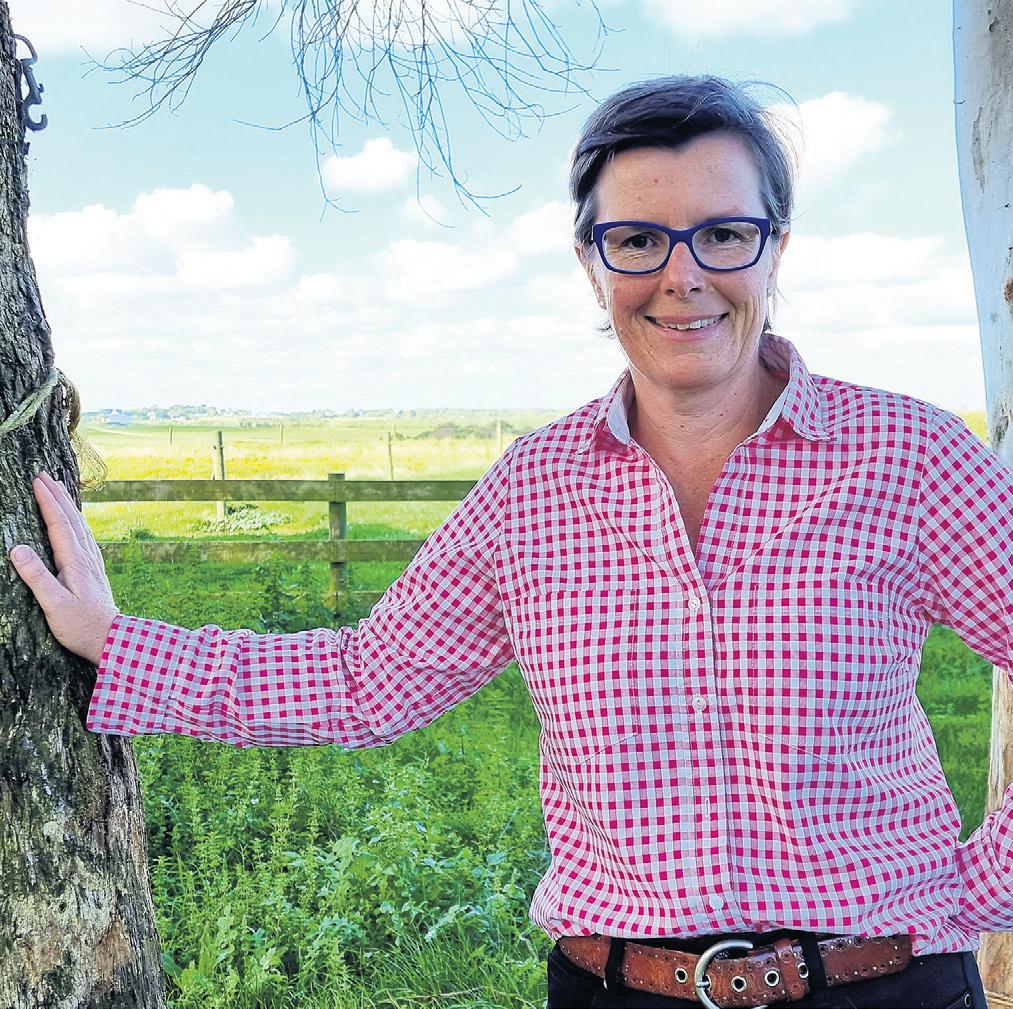
A former dairy farmer, Mrs Jenkins now works in advisory, coaching and facilitation roles along with running a chicken and beef enterprise at South Purrumbete.
She said the training had given her new leadership skills and effective questioning techniques to help farmers reach their goals.
In addition to facilitating Dairy Australia’s OFOP, Mrs Jenkins also facilitates a WestVic Dairy Focus Farm and does project work for Dairy Australia helping with an online tool for farmers to assess their environmental management practices.
She also works more broadly in coaching teams and small business.
The course, recognised by the International Coaching Federation, covered coaching foundations such as awareness of self, flexible and positive coaching approaches using effective communication, the art of coaching including preparing a coaching plan, listening actively and questioning techniques, transformational coaching and the business of coaching.
OFOP includes workshops and one-on-one sessions with participants.
“It’s quite challenging when farmers ask what do you think we should do,” Mrs Jenkins said.
“Now I can use different open-ended questioning techniques to help them come to those decisions, which I believe will be of great benefit to dairy farmers in the program.”
Mrs Jenkins, who also contributed to the cost of the course, said the FireUp course allowed her to practise on other participants in a supervised format.
“I was able to bring up issues and work through them,” she said.
“I got a better insight into myself and being able to apply that to farmers and other people.”
The success of the program has prompted her to explore other opportunities to offer business coaching.
“I think there are potential gaps in the dairy industry and in agribusiness in general to get farmers to learn about themselves.
“Who knows where that can go.”
Mrs Jenkins said the $5000 DemoDAIRY Foundation scholarship had been very helpful.
“Because I had the ongoing focus on Our Farm, Our Plan, I knew I’d get benefits for that program and for other projects I facilitate.”
DemoDAIRY Foundation has a variety of scholarships and grants available. Visit https://www.demodairy.com. au/scholarships-and-grants/ for more information.

Vibe is a very persistent and very high yielding diploid Italian ryegrass, having been developed as part of a 15 year breeding programme focused on developing more persistent Italian ryegrasses. Vibe handles hard grazings very well and hangs in there when most other Italians won’t.

At +27 days heading date, Vibe is up to 10 days later heading than traditional Italian ryegrasses, enabling it to maintain forage quality for longer into the spring. And with low aftermath heading, it returns quickly to vegetative state, enabling higher livestock performance potential.



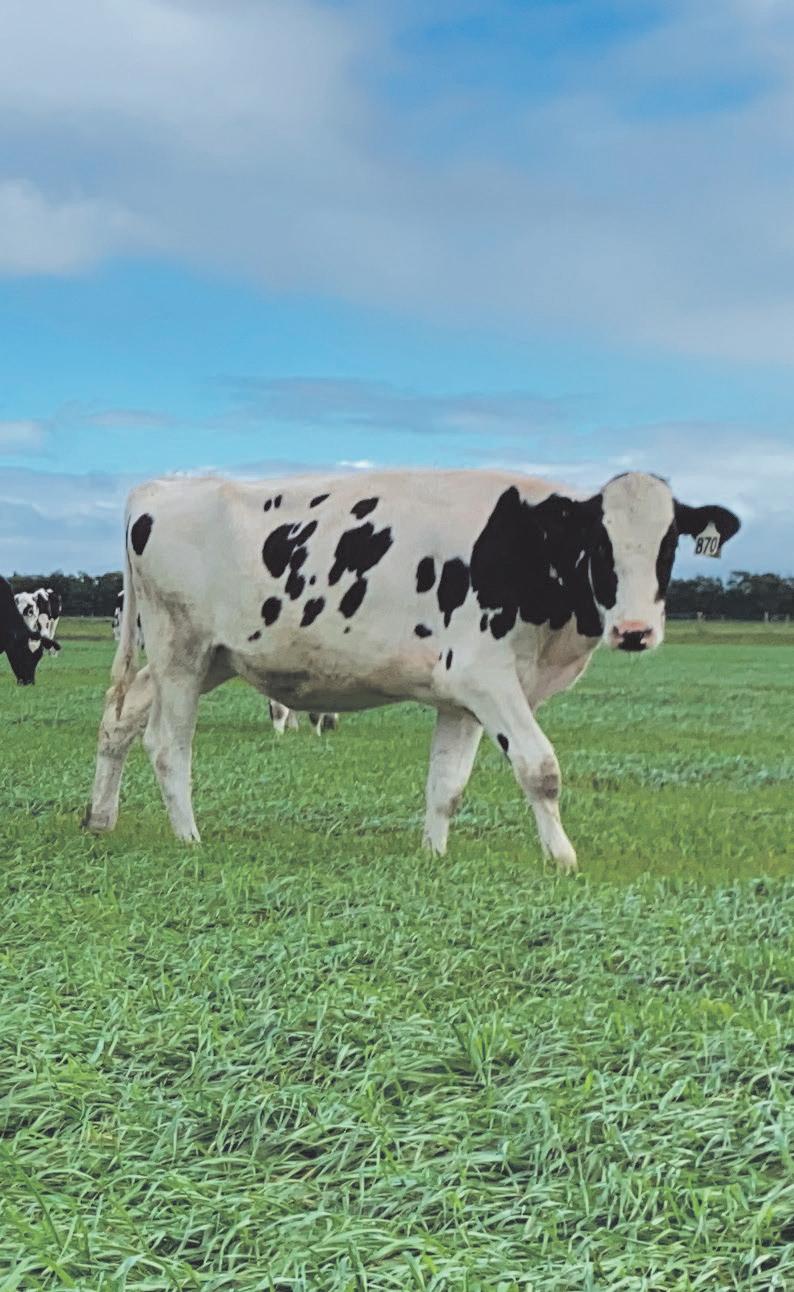





AS A large animal vet in south-west Victoria in the 1990s, Chris Hibburt was a regular visitor to local dairy farms.
So, when he was looking for a local investment with three other partners, a dairy farm was the logical choice.
Chris was one of the first local corporate dairy farm owners in the region, and nearly 28 years later he still sees the benefits of the system.
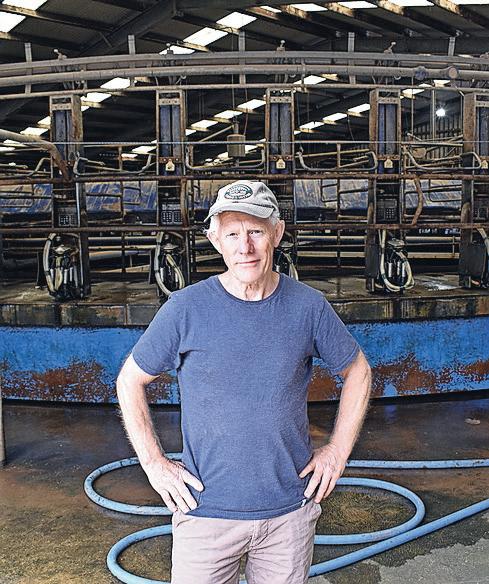
“For our old and not so old dairy farm owners, getting out has been a potential challenge,” Chris, 66, who has recently finished his professional life as a vet and farm consultant, said.

“The issues of lifestyle, managing labour, and the amount of capital involved all become reasons for farmers to consider exit.
“Improved land prices means that selling has become an attractive option compared to leasing or having a sharefarmer.
“We are now seeing more corporate investors looking to buy these bigger farms.”
However, back when Chris and his partners first invested in a farm near Port Campbell in 1995, there were plenty of doubters.
“Since the emergence of the first corporate dairy farms in our region in the 1990s, there has been a cautious view from industry commentators and dairy farmers themselves, as to whether they would be around for long,” he said.
“Time has shown that in fact they are now a growing part of our industry and in some regions like Tasmania, they account for more than half the milk supply.”

Chris has seen many corporate farms come and go and said there was much to learn from how the good ones succeed.
He said one of the keys to success was having good corporate governance, underpinned by having a clear farm strategy agreed to by the owners.
“To be effectively implemented, it is important to have a management structure in place so that those with responsibilities are held accountable.
“As much as it is great to have lots of good ideas, if there are too many people telling the manager what to do, it won’t work.”
Chris said corporate farms could benefit in scale by improved procurement and the ability to negotiate a better milk price through volume of sales.
The administration is done by head office so there is less need for a hands-on manager to do more than handle the day-to-day operations.
However, Chris admits it is hard to replicate the dedication that an owner has for their own farm.
According to Chris, the key to having a wellrun farm is to have a simple farming system.
“Design the farm to suit people and don’t expect people to work long hours,” he said.
“That may mean calving in summer and autumn when the days are longer and weather kinder on staff and animals, and afternoon milkings that do not eat into evenings makes for happier staff.”
Chris said having good communication at all levels, investing in the right infrastructure and
treating people well were all prerequisites of a successful corporate farm.
“Everyone needs to have a back-up who can do their job so they can get away, especially the manager.”
One of the benefits of a corporate model is that funds can be made available for significant upgrades that would potentially take many years to pay off if done through borrowing and debt servicing.
“Spending wisely on infrastructure, new technologies and additional land can make a corporate farm a great place to work,” Chris said.
“Shareholders eventually get good returns when the farm is well run with happy staff who enjoy coming to work and treat the farm as their own.
“That will only happen with quality managers in place who are backed by investors who understand the industry.”
However, corporates don’t offer a place for owners to live and work.
“The staff have their jobs and they don’t want owners looking over their shoulders all
the time,” Chris said.
“There are different models of corporate farming.
“Our model is towards family farming but it’s still a corporate farm owned by people who don’t operate on the farm. We’re nearby but none of us need to go to the farm very often.”
Chris said dairy farming was a long-term investment and the corporate model could be a rewarding experience for investors if done well, offering much more than a financial return and increase in value.
“In my farm consulting work, it has helped to have input in changing things on my own farm which allowed me to help others.”
The industry now sees corporate farming as a prominent part of investment.
“It comes down to who is going to buy the farm,” Chris said.
“Family farms that want to grow don’t necessarily have the ability to buy more farms.
“Having corporates in the market provides more buyers for farmers when they come to selling.”
Chris Hibburt says having corporates in the market provides more buyers for farmers when they come to selling. Chris Hibburt has seen attitudes towards corporate farms change over the past 27 years.AS CONDITIONS heat up and vegetation dries out, the CFA is warning people to avoid driving vehicles, farm machinery, mowers and motorbikes through dry grass.
Following a string of hot weather at the start of the year, fuel in the south-west region are curing quickly.
The CFA has already responded to a number of significant grass and stubble fires started by mowers, vehicles or machinery, including a 121ha grassfire in Illabarook, believed to be started by a seized bearing on a header.
The fire quickly spread to dry grass, with flames reaching about nine metres, and required air firefighting appliances to support a significant ground response to bring the fire under control.
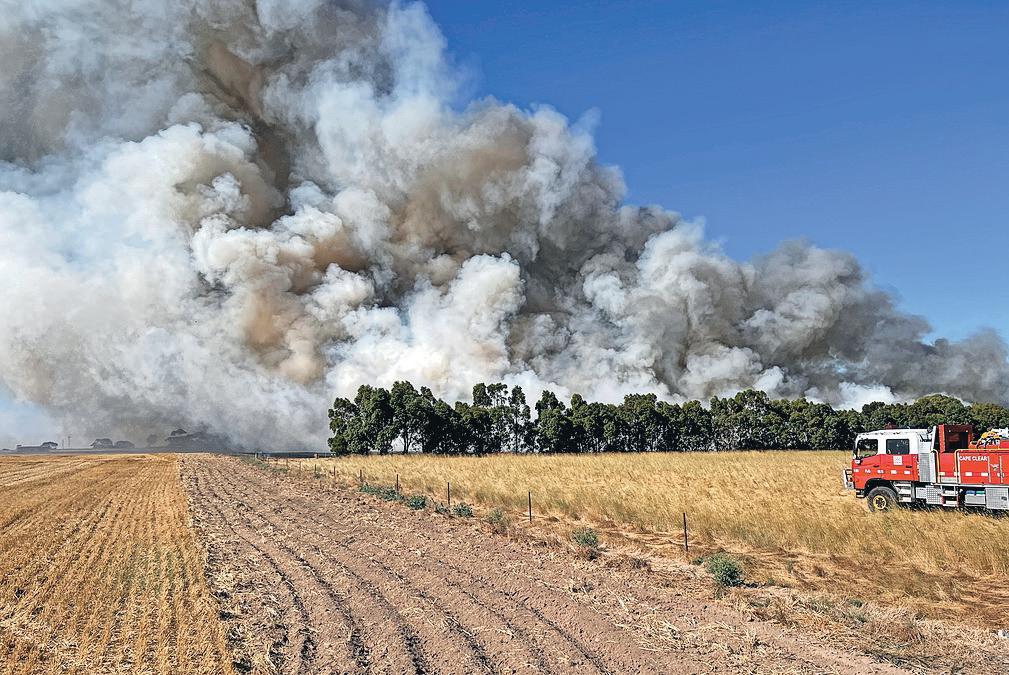
CFA chief officer Jason Heffernan said the fires served as a timely reminder for people to be aware of the fire risks associated with using vehicles and other machinery in and around dry grass
“Victoria is expected to experience a grassfire-dominated fire season once again, but we’re asking the community to do all it can to prevent these fires from starting,” Mr Heffernan said.
“In many areas across the state, the risk of starting a fire from hot exhaust system or other hot parts from farm machinery is high.
“Even pulling over onto tall, dry grass on the side of the road during your travels could start a significant grassfire.
“Awareness is key to preventing grass and crop fires.
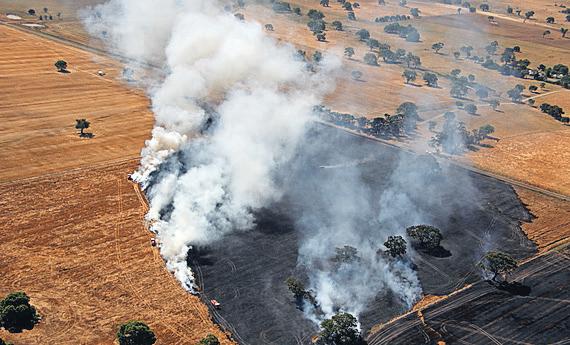
“We also want farmers to ensure their machinery and equipment are regularly inspected, maintained and cleaned.”
High risk and agricultural activities such as harvesting, grinding, welding, slashing or mowing can quickly ignite fires in hot, dry and windy conditions.
In the right conditions, grassfires can move at speeds of up to 25 km/h and spread across roads and highways.
Victorians should stay prepared and informed this fire season.
This means downloading the VicEmergency app and getting familiar with the new Fire Danger Rating System by checking the rating in your area.

To learn more about the risk of grassfires, go to the CFA website at: cfa.vic.gov.au /planprepare/am-i-at-risk/ grassfires-rural
If you’re using farm machinery or vehicles, ensure they are free from any faults and mechanical defects, fitted with an approved spark arrestor and carrying a water fire extinguisher.
Be aware hot exhaust pipes and mufflers can start grassfires.
The accumulation of grass around the underbody of vehicles can create a fire risk.
The key to avoiding harvester fires is diligence in clean-down and inspection. Check the Fire Danger Rating by visiting: www.cfa.vic.gov.au/warnings-restrictions/ total-fire-bans-and-ratings
Download the VicEmergency app for realtime updates about emergencies across Victoria.
Flames at a grassfire in Illabarook in January reached nine metres in height.THE SUNGOLD South West Field Days will be postponed in 2023, due to a lack of a suitable site in the greater Warrnambool area.
Goulburn Valley-based McPherson Media Group (MMG) acquired the field days last November from dairy processor Saputo.
The event, which has been running since 1981, is the one of Victoria’s premier agriculture events.
“Given the field days are usually held in February, time has run out, so unfortunately we’ve had to make the tough decision to postpone the 2023 event while our search for a suitable site continues,” he said.
Mr Gilbert said MMG had re-branded the field days as the Sungold South West Field Days and was committed to its future in the region, once a partnership was established with
Farmers are improving drought recovery, readiness and climate adaptation by accessing a Regional Investment Corporation low-cost, long-term loan to better prepare for anticipated severe weather disruptions.
Following devastating floods last year in some parts of NSW, Victoria, South Australia and Tasmania, drying conditions remain a major concern.
Latest climate research suggests El Niño conditions will soon return, resulting in prolonged periods of dry weather.
In addition, climate change continues to influence the Australian agricultural sector.
RIC chief executive officer John Howard said the RIC was pleased to be able to support farm businesses to prepare for drier conditions.
“The challenging reality of drying conditions isn’t something we want to think
Drought loans from the Regional Investment Corporation will allow farmers to future-proof their business by selecting new crops and building new water catchment infrastructure.
conditions as they adapt to climate change,” Mr Howard said.
“One customer has used their drought loan to build two new dams and increase their water capacity by about 70 per cent.
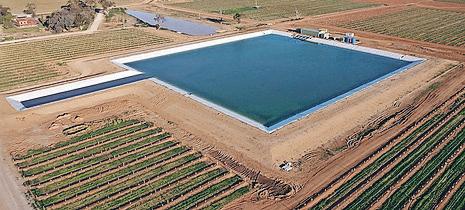
“Another family farming business has used their loan to adapt to shifting market trends and invest in horticultural crops to future-proof.
“RIC loans are designed to back farm-
